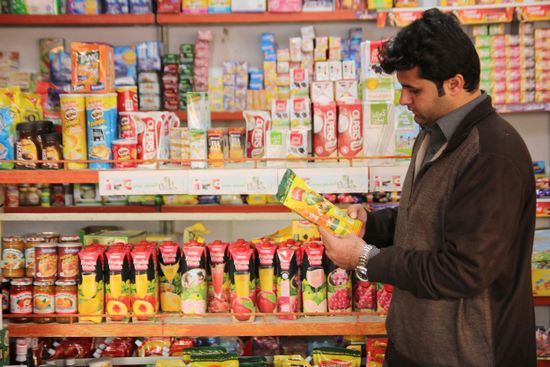
Monitoring food industry compliance with government regulations to improve food environments and promote healthier diets is critical to ensuring positive health outcomes. This course provides guidance on how to effectively develop, implement and improve methods and systems for monitoring and enforcing food industry compliance, with particular reference to three key types of food regulations: labelling, reformulation and regulations on marketing of food and non-alcoholic beverages to children.
Photo credit: WHO / Emme Khan
Please note: These materials were launched on 13/10/2022
Language: English
Health topic
Course information
Overview: As food supplies and dietary patterns change across the world to include more processed, packaged and pre-prepared food, governments are implementing regulations to improve food environments and promote healthier population diets. Monitoring food industry compliance with these policies, and taking enforcement action where necessary, is critical to their effectiveness.
The aim of this course is to support the development, implementation and strengthening of systems to monitor and enforce compliance with these regulations. Three key food regulations recommended by the WHO are discussed:
- Food labelling regulations, including nutrient and other declarations on the back of pack, front-of-pack nutrition labelling, and health and nutrition content claims
- Food reformulation initiatives, such as government-led targets for salt, sugar or trans-fats reduction in processed packaged and prepared foods
- Regulations on the marketing of food and non-alcoholic beverages to children, including on television, social media and other digital marketing channels, and in areas in and around schools.
The target audience for this course is government and non-government policy makers, program administrators and officials involved in non-communicable disease and/or food product control. The course focusses on the WHO South-East Asia region but will also be useful for participants in low- and middle-income countries around the world.
Course duration: Approximately 2 hours.
Certificates: A Record of Achievement will be issued to participants who score at least 80% in the final assessment. Participants who receive a Record of Achievement can also download an Open Badge for this course. Click here to learn how.
What you'll learn
- Describe WHO recommended regulatory options to address obesity and diet-related non-communicable diseases
- Identify practices that support the development and implementation of effective regulation
- Outline different options for monitoring food industry compliance with regulation
- Discuss the pros and cons of different options for monitoring food industry compliance
- Discuss relevant considerations for designing a system for monitoring compliance
- Describe reasons to address non-compliance and list some examples of non-compliance
- Describe potential enforcement actions and understand the importance of appropriately targeted sanctions
Course contents
Module 1: Regulation to promote healthier diets:
A brief overview of regulations to improve population diets recommended by WHO and general principles for developing and implementing effective public health regulation.Module 2: Methods for monitoring compliance with regulation (part 1):
Different methods for monitoring food industry compliance with regulations to improve diets are outlined, with strengths and weaknesses of each option provided.Module 3: Methods for monitoring compliance with regulation (part 2):
Different methods for monitoring food industry compliance with regulations to improve diets are outlined, with strengths and weaknesses of each option provided.Module 4: Applying monitoring methods:
This module discusses how to select methods and build a monitoring system, depending upon country needs and resources.Module 5: Acting on non-compliance:
The importance of action to address non-compliance is discussed, including examples of non-compliance and suggested appropriate responses.
Enroll me for this course
Certificate Requirements
- Gain a Record of Achievement by earning at least 80% of the maximum number of points from all graded assignments.
- Gain an Open Badge by completing the course.